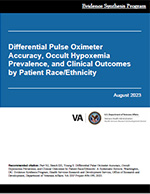
|
Recommended citation: |
Download PDF: Complete Report, Executive Summary, Report, Appendices
Pulse oximeters likely overestimate Black or African American patients' blood oxygen saturation level, and occult hypoxemia is likely more common among Black or African American patients compared with White patients. Asian, Latino or Hispanic, Native American or Indigenous, or other or mixed race/ethnicity patients may also experience occult hypoxemia more frequently than White patients.
Pulse oximeters are used in many clinical and home care settings, largely because they provide a rapid and noninvasive means of assessing oxygen saturation. Despite this utility, differences in pulse oximeter accuracy by patient race/ethnicity have been observed in clinical settings for several decades. The COVID-19 pandemic has heightened concern that pulse oximeters may routinely be less accurate in patients with darker skin pigmentation, in turn increasing risk of occult hypoxemia and poorer clinical outcomes.
Pulse oximeters likely overestimate Black or African American patients' blood oxygen saturation level, though recent studies in contemporary hospital and health system settings suggest modern pulse oximeters possess some degree of bias and considerable imprecision regardless of patient race/ethnicity. Occult hypoxemia is likely more common among Black or African American patients compared with White patients, and Asian, Latino or Hispanic, Native American or Indigenous, or other or mixed race/ethnicity patients may also experience occult hypoxemia more frequently than White patients. Evidence is insufficient to draw conclusions about clinical outcomes attributable to race/ethnicity biases in occult hypoxemia, but there does appear to be some signal that Black or African American patients with undetected hypoxemia could experience poorer treatment delivery and clinical outcomes compared with White patients with undetected hypoxemia. Although changes to clinical practice to accommodate bias and imprecision in pulse oximeters may help to reduce risk of occult hypoxemia and mitigate harms in the near-term, advancements in noninvasive oximeter technology are needed.
Differential Pulse Oximeter Accuracy, Occult Hypoxemia Prevalence, and Clinical Outcomes by Patient Race/Ethnicity: A Systematic Review (Management Briefs)